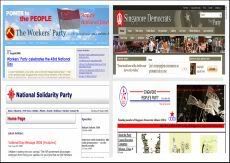Announcement: We apologise if you are experiencing some difficulty with this site. We are investigating the cause. We ask for your patience. Thank you.
Andrew Loh / Deputy Editor
From “anonymous counter-insurgents” to “openning up” in cyberspace, the Government is being forced to change its policies. But how will the opposition respond?
 Having sat through the two hours of the Prime Minister’s National Day Rally speech, I am somewhat nonchalant about the announcements he made, particularly about the changes in the political sphere.
Having sat through the two hours of the Prime Minister’s National Day Rally speech, I am somewhat nonchalant about the announcements he made, particularly about the changes in the political sphere.
Earlier reports and write-ups in the local press and various comments by Government ministers had given clues that the changes were to be expected. Although I am glad that the Prime Minister has finally made them public, and thus would be held to his word, I nonetheless feel that the so-called “opening up” falls short of what a first-world country or democracy should have in the first place.
More importantly, the question I have is this: So what? Does it matter whether the Government allows podcasting or not? Or public protests? Or political films? Netizens are going to engage in them anyway, just as they did in the last elections. Besides, the Internet audience isn’t as big as the mainstream media’s, or so we’re told. And how many Singaporeans would want to create a political film, anyway?
My thoughts then became: Surely the Government knows that netizens are evidently not going to be bothered by such regulations. So, why make such significant announcements – and in a speech to the nation?
Well, there are a few reasons.
Government pressured to change
One, as Chua Lee Hoong, The Straits Times’ Political Editor said in the paper today, the Government wants to be seen as being “on top of evolving issues” and “updating itself for a new generation”. In other words, the Government is “hip and happening”. In recent times, members of the ruling People’s Action Party (PAP) and Government agencies have gone onto the Internet in a big way, albeit silently. Facebook, Youtube (even NTUC has a Youtube account), blogs, websites, all have been created, revamped, re-designed, etc.
Two, the announcements set down the “OB markers” for everyone. A government as paranoid as ours is obsessed with perimeters and demarcating such boundaries in cyberspace, as it feels this is necessary for control, another of its obsessions.
Three, and this is perhaps the most important reason, a whole new generation of tech-savvy, Internet-wise Singaporeans are, for the first time in history, availing themselves of alternative sources of news and information. Further, Singapore is one of the most wired places in the world, with access to broadband Internet. To ignore this is, well, political suicide.
So, it would seem that the Government, while portraying itself as being “on top of evolving issues”, is in truth being pressured to change – by New Media. And well it should too.
Opposition’s response?
Having said all that, these changes are not surprising. The PAP government being what it is – one which, really, is quite aware of the environment it operates in – it is expected to engage the people more fervently in cyberspace. These changes are a start. Expect the presence of the PAP to be more keenly felt in cyberspace as we approach the next General Elections.
The ball now is in the opposition parties’ court. How will the opposition respond? To be sure, besides the Singapore Democratic Party (SDP), the other opposition parties are virtually non-existent on the Internet, besides a few disparate personal blogs by their members and several poorly-maintained websites which are updated only periodically.
So, while we may be skeptical of or criticise the Government’s foray into the Internet, the more important question, I feel, is about at the opposition parties: what are they going to do now to engage the new generation of potential voters who haunt cyberspace?
Ultimately, that is the question which Prime Minister Lee is asking of the opposition parties.
————-


